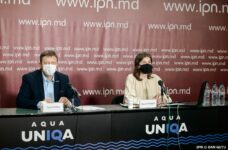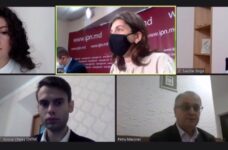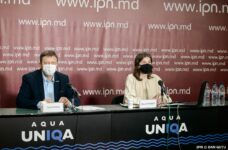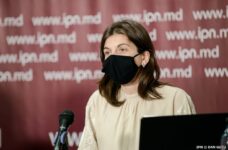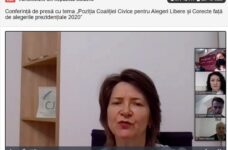POSITION OF THE CIVIC COALITION FOR FREE AND FAIR ELECTIONS
ON THE PRESIDENTIAL ELECTIONS 2020
The Civic Coalition for Free and Fair Elections considers the presidential elections of 1 and 15 November 2020 to be partially correct and partially free. The assessment is based on respect of the principles for free and fair elections set out in international treaties and conventions on civil and political rights and in the Code of Good Practice in Electoral Matters of the Venice Commission, on the Coalition’s findings before the elections on 1 November 2020, as well as on the observation of the two-week election campaign for the second round and the observation of the two election days:
Impossibility of several voters to exercise their right to vote
In both rounds, several voters were unable to exercise their voting right at some polling stations opened abroad. On November 1, this was due to limited capacity of the polling stations to serve a large number of voters, despite the extension of the voting program. After the first round of elections, the Central Electoral Commission (CEC) and the Ministry of Foreign Affairs and European Integration worked to remove the organizational shortcomings of the first round by identifying more spacious locations for some polling stations, increasing the number of technical staff and equipment. However, even in the second round of voting, many citizens were unable to vote after some polling stations ran out the ballot papers before voting end time.
Election campaign marked by negative speech, fakes and hate speech
Numerous cases of hate speech, incitement to discrimination and sexist messages by candidates, politicians, opinion leaders, journalists and citizens were observed during the campaign. The negative speech gained momentum after the first round, primarily against the candidate Maia Sandu, being accompanied by dissemination of false and defamatory messages and materials.
High number of electoral incidents on election day
On E-day, Promo-LEX observers reported a high number of cases regarding the violation of voting secrecy, non-compliance with the sanitary-epidemiological requirements, but also the organized transportation of voters. Most cases of organized transportation took place in polling stations set up for voters residing in Transnistrian region. In addition, observers also reported credible cases in which Transnistrian voters acknowledged that they had been rewarded for exercising their voting right.
Cases of obstructing observation and intimidation of observers
The Promo-LEX election observation mission reported attempts to intimidate its observers immediately after the first round, when they were called, apparently by the police, and asked to provide detailed information on some reported incidents. The observation mission describes these situations as selective justice and organized attempts to intimidate national observers before runoff election. Isolated incidents of intimidation of observers by police and election officials also took place in the second round of voting. In both rounds, cases of obstructing the observation activity were reported.
The misuse of administrative resources in election campaign
Promo-LEX observers have identified many cases of misuse of administrative resources. Most of them concerned the assumption of merits for the work done on public money and the involvement of civil servants in electioneering during business hours or on vacation leaves requested during election campaign. In most cases, administrative resources were used to support independent candidate Igor Dodon. There were many documented cases when representatives of PSRM, the party that did not nominate its candidate for the presidential election, participated in Igor Dodon’s electoral campaign.
Unresolved election litigations and complaints
Most election litigations, some of them being obvious violation of electoral law, remained unresolved, and complaints filed with courts were not examined on the merits, being delayed or declared inadmissible. Parliament’s failure to bring the provisions of the Election Code concerning the filing, examination, and resolving of election complaints in line with the provisions of the Administrative Code resulted in the limitation of election candidates’ right to challenge the actions of their competitors and practically deprived of the right to an effective remedy.
Election campaign financing remains less transparent
No initiative group or electoral candidate reported expenses for the work of signature collectors, agitators, and volunteers, but neither declared these services as material donations. According to Promo-LEX estimates, all non-registered and registered candidates have not reported over 6 mln. Lei (300 000 Euro) election campaign expenses.
Unbalanced media coverage of election campaign, without informing the public of voting procedures
With a few exceptions, TV and online media have acted partisan in the election campaign, presented candidates in an unbalanced way, also promoting a strong gender imbalance, and failed to provide the public with complete information about the electoral process and voting procedures. Only two TV stations out of the ten that CALC monitored presented all presidential candidates in a relatively balanced and neutral way. Three TV stations were very partisan in favour of one candidate and the rest had a slightly disbalanced editorial policy, favouring some election candidates. The Audiovisual Council, the broadcasting regulatory authority, failed to act adequately and promptly to ensure fair and equidistant coverage of candidates by all broadcasters. In contract with the first round, when the CA verbally warned the broadcasters that violated the law, in the second round it imposed fines on most of monitored TV stations, regardless of the violations’ seriousness. Although the public television station Moldova 1 had covered in a balance way the election campaign, it changed the rules of the debates before the second round, in favor of the candidate Igor Dodon.
Most of 12 online news websites monitored by CALC openly expressed their election preferences through biased editorial behaviour and unbalanced presentation of electoral contestants. Throughout the election campaign, but especially before the second round, several PSRM affiliated web portals carried out a concerted campaign to discredit, label and place in a negative context the PAS candidate Maia Sandu, distributing false and denigrating news, biased opinions with verbal assaults, insinuations, sexist titles and wording, hate speech and discrimination. At the same time, the independent candidate, supported by PSRM, Igor Dodon, was massively promoted and placed mainly in a positive context. Most online media sources have neglected the rules of journalistic deontology, publishing insufficiently documented material, without a clear distinction between facts and opinions and without offering the right of reply.
Smear campaign against non-governmental organisations
The election campaign was marred by an unprecedented attack on non-governmental organizations, sought to discredit, using fakes and defamatory accusations against the whole civil society, of which the main target was organizations involved in monitoring the electoral process, the defence of human rights, justice reform, the fight against corruption, freedom of the press, the social and medical field, etc. The denigration campaign launched by a deputy of the Party of Socialists of the Republic of Moldova and taken over by the PSRM affiliated media, continued throughout the election campaign.
Discrimination against people with disabilities
People with disabilities have faced barriers to physical and information accessibility. Over 70% of polling stations are not accessible for people with locomotor disabilities, and only fewer than 1% are accessible. Most election candidates failed to develop and distribute materials in formats that were accessible for people with disabilities, except one candidate who published her platform in Braille. The people with mental and psycho-social disabilities from residential institutions, which imposed a quarantine on their residents due to the epidemiological situation and restricted their contact even with family members, had no access to any election-related information.
The legal framework governing elections contains loopholes and problematic provisions
The electoral legal framework applied in these elections has not been improved in line with the referrals of the Constitutional Court issued in 2016 and those provided by national election observation missions, the OSCE/ODIHR, and the Venice Commission. Many problematic provisions concerning the sanctioning of the organized transportation of voters, hate speech, incitement to discrimination, the involvement of religious groups in election campaign, and the application of mechanism for solving complaints and litigations concerning the administration of elections remained unresolved. This led to the maintenance of these types of electoral incidents, and in some cases to an increase of their number at the 2020 presidential elections.
The election campaign was carried out ignoring the COVID-19 prevention measures
The CEC has taken constant steps to ensure the safe conduct of election campaign and the voting process, by purchasing safety masks, gloves, and disinfectants for election officials. However, many election management bodies ignored the requirements concerning protection measures in a pandemic context, as did many election candidates and their election staffs during campaign activities. By disconsidering anti-COVID-19 measures imposed by the National Extraordinary Commission for Public Health against COVID-19, election candidates showed lack of consciousness and disrespect toward voters, promoted defiant behaviours toward the measures taken by authorities to prevent the COVID-19 infection, and created additional risks of spreading the infection among the population.
Differentiated participation of young people in voting
Young people living abroad registered an absolute record of turnout at the polls, compared to the low turnout of young people in the country. This is due to the unfavourable legal framework for exercising their voting right within the country, namely voting requirements at the place of residence, but also to the superficial approach by candidates of the needs of young people, who are often involved in campaigns as volunteers, including young people under 18.
___________
www.alegeliber.md—The Civic Coalition for Free and Fair Elections is a permanent voluntary entity formed of 34 nongovernmental organizations from the Republic of Moldova to contribute to the development of democracy in the Republic of Moldova by promoting and holding free and fair elections in accordance with the standards of ODIHR (OSCE), the Council of Europe, and its specialized affiliated institutions.
The statement in Romanian can be found HERE.
The statement in English can be found HERE.
The statement in Russian can be found HERE.

